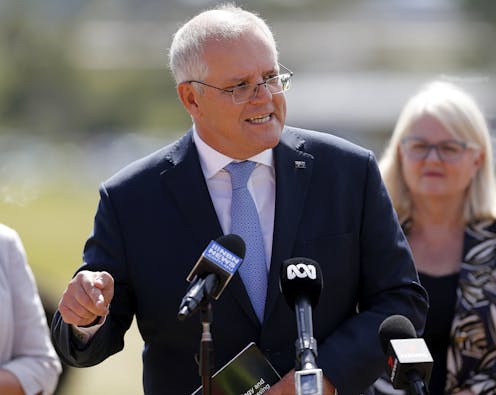Can Scott Morrison's rhetorical style cut through the rising tide of anger?
- Written by Annabelle Lukin, Associate Professor in Linguistics, Macquarie University

The word “sophistry” – defined as “the use of clever but false arguments, especially with the intention of deceiving” – comes from Ancient Greek. For more than 2,500 years, politicians have understood language is a tool, even a weapon, for climbing up the political ladder and clinging to power.
So it’s no surprise modern politicians such as Prime Minister Scott Morrison have a bag of rhetorical strategies and tricks they bring into parliament and to every press conference.
As a linguist, I have followed Morrison’s rhetorical development from his budget speeches as treasurer, his defence of himself and his government in the face of the 2019-2020 bushfire crisis, and now allegations of rape against a senior staff member then in the defence minister’s office, and another against Attorney-General Christian Porter.
Under the pressure of these complex political matters, Morrison has developed his trademark, slippery rhetorical style.
In response to questions he doesn’t like, he dismisses “the Canberra bubble”, aligning himself with the ordinary people not driven by the insiders’ navel-gazing.
He regularly rejects the premises of the questions put to him, speaks in language so general and contentless that he could be answering a thousand different questions, or answers specific questions with broad generalisations or policy statements. When it suits, the matter just doesn’t fall within his sphere of influence.
And he also brings a belligerence to his rhetorical game.
Read more: View from The Hill: Despite his denial, Christian Porter will struggle with the 'Caesar's wife' test
While Victorian Premier Dan Andrews fronted daily press conferences on Victoria’s lockdown, answered every question and rarely responded with impatience or anger, Morrison tries to wield his power to control speaking turns of journalists at press conferences, as this Tik Tok mashup of “Andrew, you don’t run this press conference” reminds us.
Being aggressive to journalists is an extension of his “man in the street” impatience with the “Canberra bubble” insiders. Until now, it has been a successful strategy for containing questions and dodging accountability.
But while a rhetorical strategy can work a treat in one context, it can be a total train wreck in another.
To contain the growing political problem now engulfing the government, Morrison has gone back to his belligerence. At a press conference ostensibly for releasing the report into the Aged Care Royal Commission report this week, Morrison lectured and belittled journalists.
To avoid dealing with the rape allegations, he strung out the questions on aged care as long as he could. On three occasions, a journalist tried to ask him about the historical rape allegation against one of his cabinet ministers.
But Morrison insisted such questions had to wait until he was ready. Rape, it seems, could wait her turn.
Morrison answered 45 questions on aged care. To some, he gave lengthy, if empty, answers. The average overall was 86 words per answer.
When these questions looked like drying up, he drummed up more business. He answered every single question on aged care.
When discussing aged care, his authority appeared to have no limits. He interrupted a legitimate question about the government’s position to remind the journalist that he was the prime minister, and that he and his cabinet would take the necessary decisions.
But on the rape allegation, his power suddenly evaporated. “See, I’m not the commissioner of police” and “I’m not the police force”, he told assembled journos. It was the sexual assault version of his famous line “I don’t hold a hose, mate”.
After fielding 26 questions – many of which he answered in the most minimal of terms, and now averaging just over 50 words per answer – Morrison actively shut down the questioning.
For so many women, their experience of sexual violence is made even more traumatic by the symbolic violence that follows it. They are told they are to blame, it’s all in their head, just get over it.
Or they are deliberately silenced.
Morrison’s “everyman” pantomime, his artful dodging and his dismissive belligerence are now coming up against a rising tide of anger. And, so far, none of his standard strategies have cut through.
Authors: Annabelle Lukin, Associate Professor in Linguistics, Macquarie University




